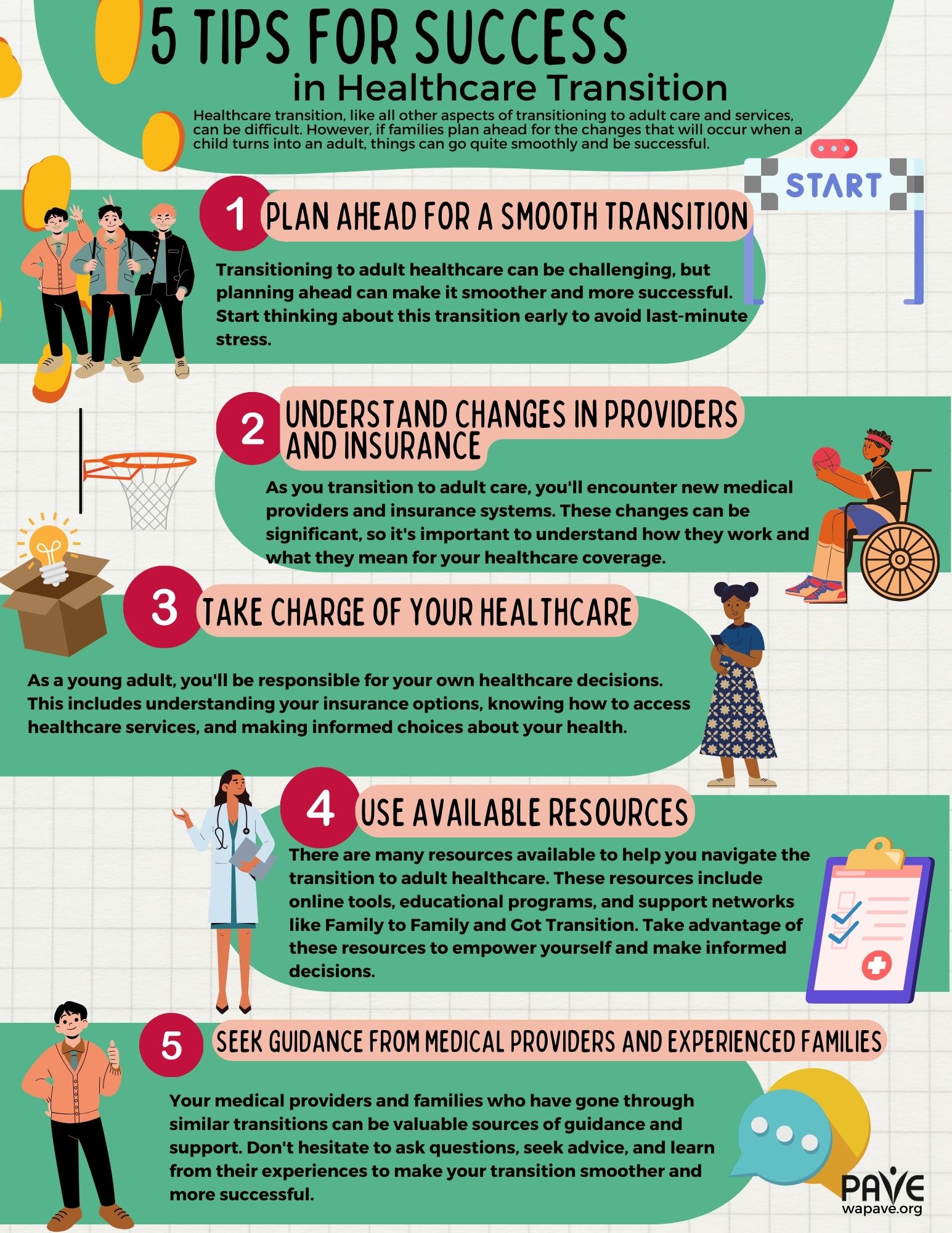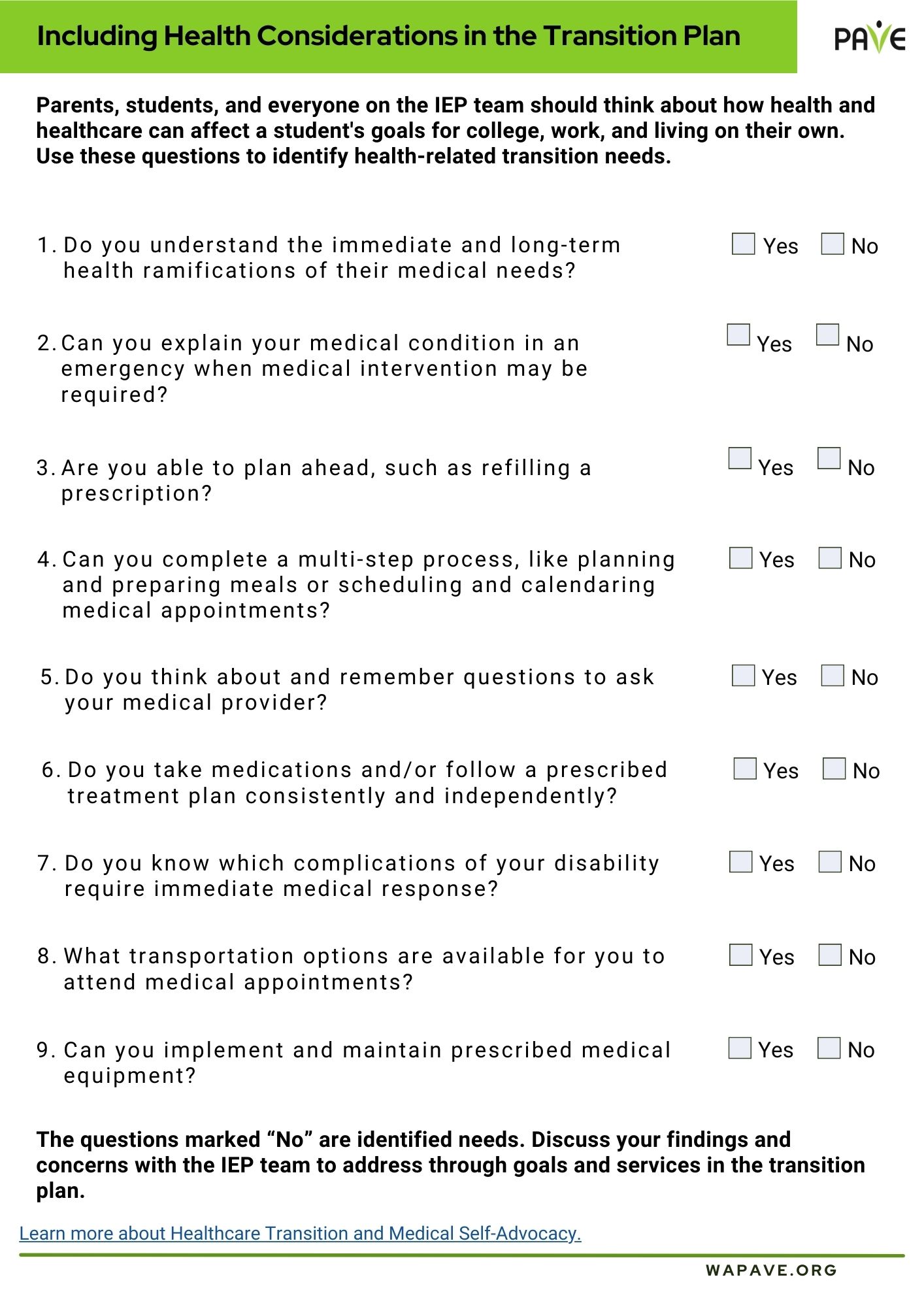Healthcare transition, like all other aspects of transitioning to adult care and services, can be difficult. However, if teenagers and families plan ahead for healthcare changes that occur when a child becomes an adult, things can go smoothly and be successful. Here are some resources and information for making the health care transition to adult care successful and seamless.
There are two main components for individuals transitioning from pediatric (children’s) to adult health care.
- New medical providers and systems, including changes in insurance.
- The young adult’s new responsibility to be in charge of their own health care.
Health Insurance and Providers
For individuals on Medicaid, Medicare, or private health insurance, eligibility, cost, and what services are covered may change.
Washington’s Medicaid option, Apple Health, has different financial requirements for adults than they do for minors. See the chart below for current income requirements for Apple health.
| Program | Single person | 2-person house-hold | 3-person household | 4-person household | 5-person household | 6-person household | 7-person household |
| Apple Health for Adults, age 19 through 64 years of age | $1,677 monthly | $2,268 monthly | $2,859 monthly | $3,450 monthly | $4,042 monthly | $4,633 monthly | $5,224 monthly |
- To apply or renew for Apple Health, go to the Health Plan Finder website. Even if an individual is not eligible for fully subsidized healthcare, the Health Plan Finder can reveal some low-priced options.
- For young adults on their parents’ private insurance, they will have coverage under their parent’s plan until they are 26, at which time they will need to apply for their own health insurance. The Health Plan Finder can help you find affordable options, including Apple Health.
- For individuals under 65 who are receiving Medicare due to a disability, insurance should not change due to the transition to adulthood.
A person’s health insurance may limit the health care providers available. Once you and your family know what type of health insurance you will have, you can select from physicians and other health professionals who accept that insurance. Most medical practices either list what insurances they accept, or you can call the office and ask. Health care insurance plans may also send information on where to find a provider, or you may find it on their website.
Taking on Responsibility for Health Care and Decisions
Healthcare is just one of many new responsibilities that young people take on as they become adults. Parents and teens can avoid overwhelming a teen with new obligations, beginning with giving younger teens options and increasing tasks to help them adapt to this change. There are several resources for families and youth to use in this transition:
- Family to Family has a youth-written curriculum about Transitioning to Adult Doctors for individuals with disabilities that can help teens start their medical transition journeys.
- Charting the LifeCourse™ was created by families to help individuals and families of all abilities and all ages develop a vision for a good life, including their health care.
- Got Transition is a comprehensive website about the transition to adult health care, with quizzes, FAQs, and timelines to make it easier to understand.
- The Center for Transition to Adult Health Care for Youth with Disabilities is a national health care transition resource center. The goal of the center is to empower youth and young adults with intellectual and developmental disabilities (ID/DD) ages 12-26 to direct their own transition from pediatric to adult care with no reduction in quality of care and no gaps in service.
Beyond these resources, the most useful are the young adults, whether you are the parent/caregiver or a transitioning individual. It’s important to recognize that lived experience gives knowledge even in a new situation. There is the knowledge of medical need that may not be in a chart, emotional or behavioral challenges, developing self-determination that supports transition, and other important things only you know. Next in line are the current medical providers and specialists. They not only have helped numerous other teens transition to adult healthcare, but they are a part of developing the care plan, a critical resource for transitioning to an unfamiliar doctor or clinic when a young adult may have complex care needs. Doctors’ office staff are also used to dealing with these issues and may have some good planning advice for families. Lastly, advice from families who have already helped a child transition to adult care can help to know what to do—and what not to do! Parent-to-Parent can match parents up with families who have already gone through such transitions with those who seek their knowledge and experience.

Including Health Considerations in the Transition Plan
Parents, Students, and everyone on the IEP team should think about how health and healthcare can affect a student’s goals for college, work and living on their own. PAVE has made a fillable form that you can download when starting to think about this area in transition.


